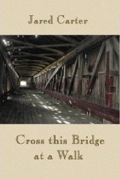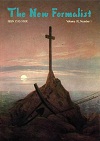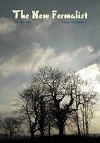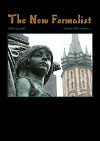That Evening
There must have been a million stars but I
take that on faith, and have no memory
of looking up at all. A quiet sea
of phosphorescence was a lullaby
to all my senses, and I did not reply
to words that fell like far off bells, while he
stood near his cabin door. I couldn't see,
but felt him as one feels a firefly
is circling near although its light is gone.
It was his world, but wasn't mine for keeping,
and so I left as if I'd come again.
But, like an antique lamp that we turn on
to light our thoughts although we'll soon be sleeping,
that evening flickers now as it did then.
Season
I
Youth and love unite beneath the power
of velvet skin and dark, half-sleeping eyes.
Spring seems to last forever to the flower
that feels the rush of chlorophyll's green rise.
Time is not—cannot be of the essence
when second hands are slow, standing still,
while all around the sun is streaming gold.
The thought of end, of beauty's obsolescence,
seems unreasonable and cannot hold
as long as love is dressed in daffodil.
II
Youth never sees itself or has a reason
to know that it has no infinity.
It turns, like Spring, a sweet, unknowing season,
never doubting its divinity.
But as in Fall trees look down on their leaves
that once had been too much a part to see,
powerless to reconstitute the whole;
so age sees fallen beauties and it grieves
the unclothing of the lonely soul
that, now in rags, goes begging tree to tree.
(First prize, 2001 Raintown Review Poetry Contest)
Tabula Rasa
What is this sad and alien world
into which they've come,
with field and sky unclean, and darkened sea?
With a flag of plague unfurled
and slowly beating drum,
the shrinking earth disputes eternity.
Yet, like flowers, children grow
beneath the finite shade,
and every leaf they touch they consecrate.
They rise and stretch their arms to show
how beautifully they're made,
and turn the world into a virgin slate.
(published in The NeoVictorian)
Rooms
Every room I’ve ever seen is here.
This studio with six-foot squares of light
gives way as I pass through. Another room,
familiar in the way it empties me
of hope, of sorrow, joy and fear, of life,
wears me, for a moment, like a dream
it had when it first rose from nails and wood
in frozen climes, then it releases me
into the sun again. How many other
rooms took hold I’ll never know for sure,
but they together make me doubt the truth
of happiness I held one hour ago,
of dread I nurtured for what dark could come.
Now, paper, pen and books and music scores,
place-holders for a life, lie strewn about
the rooms that shift from snow to glaring sun.
Reverie
I walked beside the ocean in a dream
and watched it swell and shrink and part and merge,
and slide from oxide green to yellow-grey,
opaque, then shot with light where golden fish
were caught a moment, in uncertainty
that reddened gold and bronzed their stippled orange
before they blackened back to sea again,
leaving me to wonder what I'd seen,
or if I'd seen at all. A hundred clouds
in shifting shapes, white with silver edges,
turning, rolling into clay-like fields
of umber, almost black, and burnt sienna,
crossed high above the water with such speed
I could imagine purpose to their flight.
But purpose, plans, and hope were human things,
and I, beside the water, by myself,
could think of nothing future, nothing past,
but only light that scattered on the sand,
so filled with salt, with remnants of what was—
a brick-red crab, an empty pink-lined shell,
an oyster left without the glistening pearl
that made us think it beautiful and worth
our measured human touch. The tender spray
of so much life against my face grew warm,
so like a kiss, so like the first embrace,
the very first when love was only joy
of rising froth and upward-spilling light;
a light connecting life to other life
to let the spirit wake and know itself,
and let it play among all living things,
to move and grow and shift and touch the world,
changing it with subtle water motion
that pulled on every thought ; to let it feel
the rush of pain and pleasure's slow sweet rise,
the shock of brilliant reds, the strange perfumes,
that lured the mind into the silent woods
where every breath was felt, and every pulse
of blood was known within the heart itself;
to let it find, in the changing shape
of living, its own perfect changelessness;
to let it live, and let it then sink back
into the shining black of hidden depths
where spirits moved like unseeing fish,
not knowing of their selves, not of the sea,
sealed in darkness, never knowing light,
or life itself. I felt the water rise,
as if to wash humanity away
with blinding foam, too much to feel and see—
and so I woke.
The dream was not of you.
I never thought of you or longed at all
to see your figure standing, looking out,
gold against the green of churning waves.
The dream was not of you, but when I woke
your face appeared and filled the aching hollow
the sea had carved so deep into my heart,
still red with life, before it ebbed away.
(published in Romantics Quarterly)
Your Melting Sky
I've saved the sound your shoes made as you walked
and kept the searing brilliance of your eyes,
and snow that warmed to water as you talked
dressing leathered death in spring's disguise.
That light embrace we thought would come again––
the one we cast away––I gathered up
and kept like new these thirty years for when
the water would spill back into the cup.
I've heard some noise of death, yes, of demise,
and listened to their tributes' rustling leaves,
and now a me that shadows me and cries
says love is measured only as it grieves;
but she says black and white, we live or die,
and doesn't know how much I've saved of you,
and while I stand beneath your melting sky
she searches for the man that she once knew.



